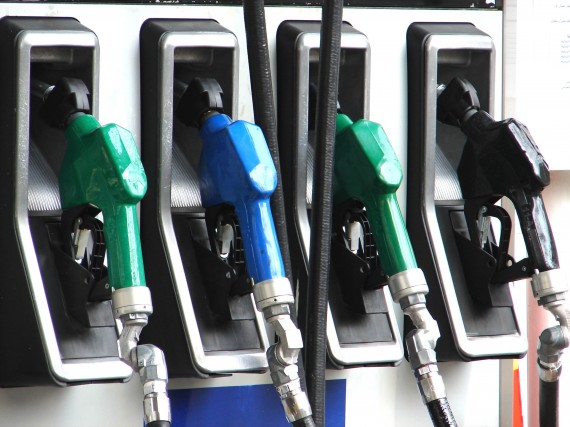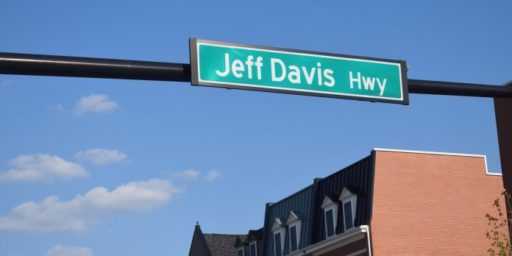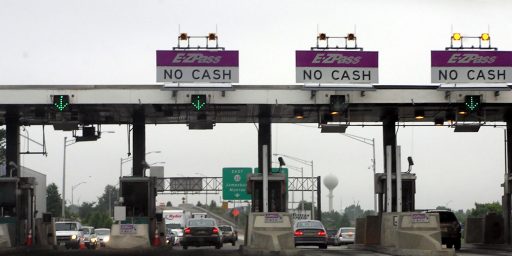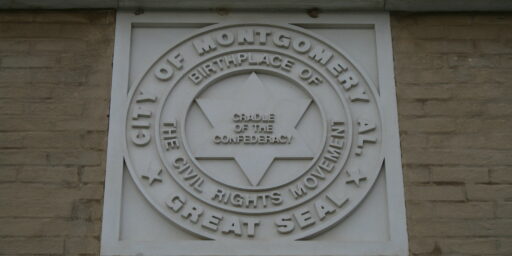Infrastructure Funding Blues
The gas tax was last raised in 1993.
 Via Politico: Pumped dry
Via Politico: Pumped dry
The gas tax pays most of the tab for America’s federal highway program; it’s what we rely on for new highways and for the bridge repairs that keep us safe. Those costs go up every year, but the tax remains stuck at 18.4 cents per gallon. In fact it’s effectively going down: since it was last raised, those 18.4 cents have lost more than a third of their value to inflation, and at the same time drivers with fuel-efficient vehicles have been buying less gasoline, further reducing the federal take.
As a result, the main U.S. spending account for infrastructure has fallen deep in the red, and the gap gets worse every year. The government, through a series of funding tricks, keeps the Highway Trust Fund on life support with short-term emergency patches. The latest infusion expires at the end of the month, and the argument about how to fix it is coming to a head this week.
The last time the gas tax was raised was 1993. I was a fairly recently married, childless, and grad student (not even yet ABD) in 1993. These days I just recently celebrated my 25th anniversary, have three teenagers (one of whom starts college next month), and am a full professor and department chair. 1993 was a long time ago.
Not only was it a long time ago, gas at the time was somewhere in the range of just a $1.00/gallon, making 18.4 cents a significant percentage–and yet now with gas two and a half to three times (or more) as much means that the tax has effectively gone down (substantially) as a percentage, not to mention the loss of value via inflation as noted in the quote above.
The problem is pretty straight-forward: Republicans don’t want to raise taxes (and, in fairness, some Democrats would prefer a different method to fund roads as they see the gas tax as regressive). Further, the situation is a quintessential example of irresponsible government insofar as roads and bridges are both essential and expensive and yet we refuse to adequately fund them all the while that we use them and demand more of them.
There is quite a bit about the history of the tax (both longer term and more recently) in the piece.
I am not saying, necessarily, that the gas tax has to be raised (as there are other ways to fund roads that could be used) as much as I am noting that this situation strikes me as an ongoing and endemic problem in US public policy: the political pressure placed on Congress to both provide services and not find reasonable means to pay for them. Even deeper, I find the notion (that is deeply embedded in the GOP) that taxes can never be raised no matter what. This is just plain irresponsible and denies the basic facts of reality (especially when we are talking about a tax set at a specific number rather than a percentage).
Meanwhile, the process continues to be nothing more than duct tape and chewing gum:
THE LATEST SHORT-TERM extension for the Highway Trust Fund—the 33rdpassed by Congress—expires at the end of next week. House Ways and Means Chairman Paul Ryan and Transportation and Infrastructure Chairman Bill Shuster last week pushed through the House yet another short-term fix, with about $8 billion, enough to get the fund through mid-December. Senate Majority Leader Mitch McConnell has cobbled together a somewhat longer-term fix, enough to get the fund through the 2016 election, when many of his Republican colleagues are up for reelection. Among the revenue sources in the three-year proposal he presented yesterday, and which the Senate may vote on today, is selling off part of the nation’s Strategic Petroleum Reserve for $9 billion–that is, instead of updating a tax on gasoline, Congress may end up selling off part of its emergency supply of it.
Surely we could figure out something better than this?






Your overall point is well taken. However I would note that our investment firm has looked at infrastructure transactions – “driven by the aging infrastructure” – for 25 years. The two main takeaways are that the expenditures never match the need, with perhaps the exception of post 2007. It’s not a funding problem. And that funds are diverted to other uses. It’s not a funding problem.
As a concept all that you say makes all the sense in the world. But in reality it’s sausage making at its best. With a number of Democratically controlled White. Houses and Congresses over the last 25 years blaming this on the GOP and it’s tax posture seems dubious.
@Guarneri:
Would you care to elaborate?
Apropos from Politico. Apparently the US Chamber of Commerce is getting a little tired of this stuff.
The theory is simple: The Chamber spent some $70 million in 2014, mostly to help Senate Republicans build their majority. But many of their legislative priorities — immigration reform, the renewal of the Export-Import Bank and a long-term highway bill — have been held up by a clutch of conservative lawmakers in the House.
More evidence the establishment GOPs will reassert control, or at least try. But IIRC the Chamber had a significant role in making the bed they now find themselves sleeping in.
not a bad blog but there’s not much in the way of “where is the money going”? and the irony is that places with dense populations use mass transit and don’t really support the hiway funds via “buying gas”. gas usage doesn’t seem to drop so there’s tons of money flowing in but as guarnei alleged, may be “misappropriated.”
raising taxes is not a panacea.
@Guarneri:
Actually, it both a funding problem and a political problem.
As an example, currently there is no willingness on the part of the people to further tax themselves to adequately fund street improvements. In many cities in CA, the annual State Gas Tax is sufficient to fund only about 25% of annual street maintenance needs. The public believes that the current tax is sufficient to get it done, and it’s a very hard sell to get the public to believe otherwise.
@bill: That sounds an awful lot like the typical “waster and fraud” approach. Do you have any evidence that funds are abundant and simply being misspent?
And you are correct: taxes are not a panacea. However, funding is essential for roads and bridge. It is an inescapable fact.
Having recently been in Dallas and Atlanta (both which also have mass transit systems), I question this assertion (and having lived in Southern California). And while I realize there are people in places like NYC and Chicago who live in urban centers sans cars, last time I checked they had a fair share of vehicles on the road.
@bill:
The amount of cities with good mass transit is pretty small; we are still, by and large, a driving country even in urban areas.
Sorry for my ignorance, but does this tax cover all roads? That is, do states and counties get a cut, or is this just for federal infrastructure? If it’s just the latter, then the amount of mass transit in cities matters even less.
I’ll throw out a couple more points. One, the wear and tear on roads caused by trucks greatly outweigh the fuel taxes paid by trucks. In effect, passenger cars are subsidizing the trucking industry. Two, trucks have gotten heavier and many highways and roads are not built to accommodate the weight resulting in more maintenance requirements. I saw one study quoted that said that one 40 ton truck is equivalent to 9600 cars. Three, conversely, hybrid and fuel efficient cars do use less gas but they are built lighter and with tires that have less rolling resistance.
Maybe there is another way to equitably assess use taxes on roads besides a per gallon gas tax. The technology is there for a mileage tax, for instance. But no one wants to explore that either.
@Steven L. Taylor: it’s as if npr read your blog and decide to counter it!
http://www.npr.org/sections/itsallpolitics/2015/07/23/425292193/surprise-americas-roads-are-improving
@bill:
That article supports the idea that we actually need to properly fund infrastructure, and the current short-term funding fixes aren’t a good, long-term solution.
The GOP side has two responses AFAICT. They want to remove mandates that don’t move automobiles along such as ‘beautification’ and bike lanes. And they want more toll roads.
Interesting the DC gets almost 5 times their fuel tax collection in their allocation. Although the national average sans DC is 0.98.
@Scott:
Trucks pay the Heavy Vehicle Use Tax. Also, tax on diesel fuel is higher and the trucks use more, even for no road time.
As it stands, the gas taxes are/were 20% of the cost of gasoline at the gas pump (January 2012)
Interestingly, most of the expenditures of the fund goes to capital outlays rather than maintenance (expenses to maintain but not extend the roads serviceable life).
And yet, road fatalities are at a historic low.
Source
But then we have this:
Steven
Citations of infrastructure spending plans are routinely published in McKinsey type studies, trade association studies and government studies. Yet without fail the actual spend falls short, but available funding exists. It’s legendary in the finance and investment world. You cut the projected spend by at least 20% without batting an eye…….or end up missing your internal projections. When you speak with consultants or industry executives you discover that, money being fungible, it finds it’s way elsewhere. It was only after the 2007 crash that I am aware the spigots were actually opened. Whether the money was spent wisely is separate debate. You are entitled to your own view but as I say, we’ve been watching this phenomenon for over two decades. I’d get the internals right first, then worry about gas taxes. I doubt the gas taxes will go where you hope.
This reminds me of calls for taxes to help the poor etc. But a cursory review shows we don’t really focus funding increases on the poor.
I have no issue with your observation that infrastructure repair is needed. We own a company right now involved in road repair activity in a certain large SW state fielding two presidential candidates. The need exists in roads, dams, bridges, air transport, water management……… But I don’t think you will get the results you envision simply through increased tax funding. Said owned company routinely has scheduled projects cancelled or “delayed” because some politician steps in and diverts funds. Handing money directly to constituents always pays better than laying rebar.
Did anyone see Cruz today blast McConnell over ExIm ? And who benefits most from ExIm ? Boeing. That’s the kind of thing that creates the reflex to protect taxpayers.
Oh and keep in mind that 2.85 cents of that 18.5 cent federal gas tax goes to mass transit. Even if there isn’t any mass transit within 10 miles of the road user.
The complaints are all well and nice, but we still need to fund the roads.
@bill: I will agree that the piece does provide a somewhat better overall picture than I would have thought was the case, but still:
About a quarter of U. S. highway spending comes from the federal government. By far the greater amount comes from the states.
The federal tab includes building new roads, rehabilitating old ones, and safety programs, mostly through grants given to the states.
Every city of 50,000 population or greater is already served by an interstate. I’m skeptical that increasing the number of interstates would satisfy a cost-benefit analysis and only a fraction of federal highway spending goes to maintenance but that brings us to the critical point.
Before we start thinking about increasing the amount of money we spend on roads we need to re-think how we decide where to spend the money. We need to focus our attention on projects in which the quanitifed benefits outweigh the realistically projected costs rather than how much seniority the Congressman in which the project will take place has. That would require a very different approach to highways than the one we have.
One other point, if I may: we are moving toward driverless vehicles over the next couple of decades. Should we not take a few minutes to consider how the ways we use roads may be quite different by the time major improvements are made?
I’m agnostic on whether the gas tax is the appropriate mechanism for funding infrastructure but agree that we have to fund infrastructure. I’m less sympathetic to the notion that I’m not paying enough towards that end given that the state has just billed me over $800 in vehicle taxes—and that’s after a discount enacted by Jim Gilmore before I got here. That’s an absurd annual levy on top of the taxes I paid upon buying said vehicles. If that money isn’t going to the roads, what’s it for?
@James Joyner:
If you lived in Illinois, I could answer that question: paying public employee pensions.
Dave makes the very point I’m trying to make.
Do me, and yourselves, a favor folks. If ever pitched to make an investment based on the infrastructure spending to result from a gas tax hike……….don’t.
@michael reynolds:
Don’t agree with your premise, but if you are correct: yes.
@James Joyner:
Virginia charges ~$60 per vehicle for registration, plus $5 per $100 assessed value as a personal property tax. How the heck do you get to over $800? How many vehicles do you own?
Also, seriously? You would whine about $800? At your salary, the marginal utility of $800 ought to be practically zero.
And, in the end, heaven forbid that the daily price for the privilege of operating a car (or is it multiple cars?) on expensive public infrastructure requiring expensive policing might be almost as much as a Starbucks beverage…